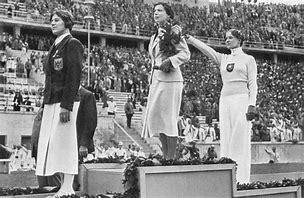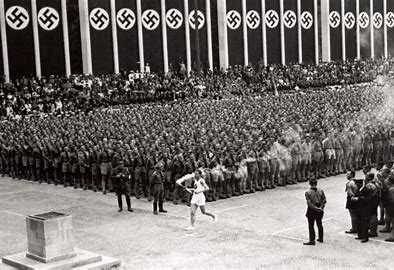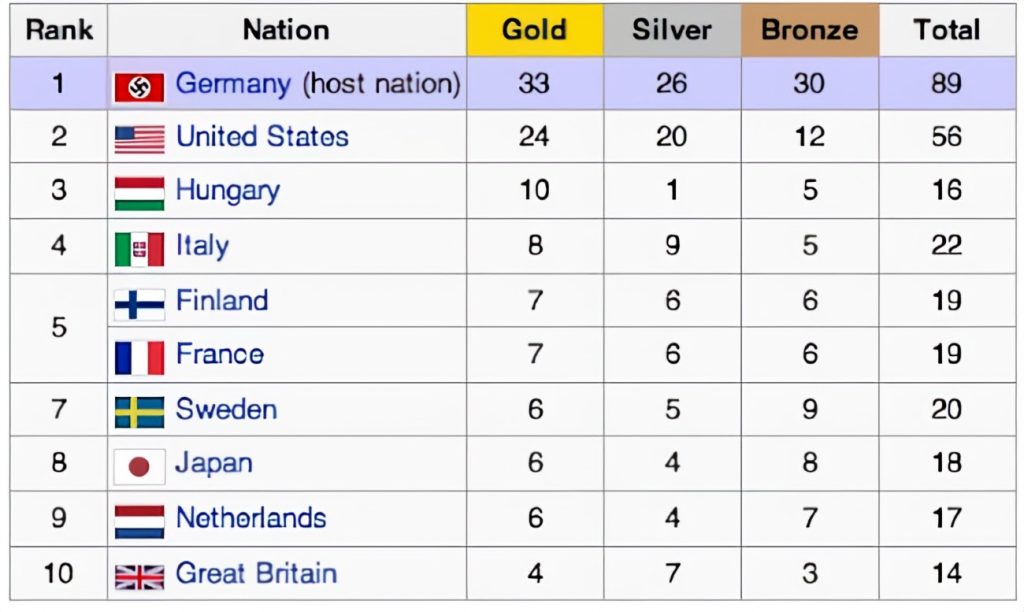The 1936 Berlin Olympics
The 1936 Berlin Olympics proved to be an important moment of change in Olympic history. Many people today believe that Nazi Germany won the right to host the Games, but it was actually the Weimar Government in 1931 (2 years before Hitler came to power) that gets the credit.
The modern Olympics had started in 1896 in Athens, Greece when 280 participants from 13 nations competed, none of them women. Further Olympic Games were held every 4 years, but they struggled to gain in popularity. The 1924 Games in Paris were the first to be considered truly successful with more than 3,000 athletes from 44 nations, including more than 100 women. [1] However, in the lead up to the Berlin Games, Adolf Hitler decided to make his Games the biggest and most impressive of the modern era.
To achieve that aim, Germany invested a lot of money on building many venues for the Games, including a huge stadium (the Olympiastadion) that held over 100,000 spectators as well as an extensive Olympic Village. The stadium still exists today and has hosted several World Cups. [2] 3963 athletes from 49 countries participated (the most countries at any of the Games up to that point in time) in 129 events. Overall, the Games were considered to have been financial success with over 7.5 million tickets sold and most events seeing full crowds. [3]
By the time the 1936 Games rolled around, controversy embroiled the event. Most of it involved Nazi Germany’s racial policies. At first, the Nazis did not want Blacks or Jews to participate in any of the events but the threat of a boycott by several countries, plus efforts to move the Olympics to another country, caused them to change their minds. Still, that did not stop them from arresting all Roma (Gypsies) in Berlin, sending them to the Berlin-Marzahn Concentration Camp in an effort to ‘clean up’ the city before the foreign athletes and spectators arrived. It is interesting to note that 2 countries did end up boycotting the event: the USSR and Spain. In fact, Spain was about to start its own alternative People’s Olympiad, but the beginning of the Spanish Civil War ended it the day before it was to begin. [4]

In the face of the potential boycott and talk of moving the Games, Hitler needed to placate international opinion and anger. Towards this end, he gave permission for the Jewish star fencer Helene Mayer, who was living in the United States at the time having been stripped of her German citizenship, to represent Germany. Mayer was the only Jewish athlete to compete for Germany. She won a silver medal in the women’s individual fencing and upon receiving her medal on the podium, gave the Nazi salute like all the other medaled German athletes did. 8 other athletes who were Jewish or of Jewish parentage won medals. The US sent 7 male Jewish athletes to the Games as well [5], though none of them ultimately competed.
The Nazis proved to be quite successful in camouflaging their violent racist policies. Most anti-Jewish signs were removed during the time foreign guests and athletes were present, and Goebbels ordered newspapers to tone down their usual harsh rhetoric. Even the virulently anti-Semitic newspaper Der Stürmer was pulled off the streets. [6] In addition, Nazi officials gave orders that German anti-homosexuality laws would not be applied to any of the foreign visitors. The end result of these measures was that the foreign athletes, spectators and journalists were fooled into believing that the new Germany had become a strong, united, peaceful and tolerant country. [7]
Germany promoted their Olympics through the lens of their racial theories. They linked Germany with Ancient Greece, tying their country to the great successes of Alexander the Great and the following Hellenistic Period. The Ancient Greeks were equally racist in their world outlook as well as equally self-assured about their superiority over the surrounding cultures. In essence, the Nazis claimed to be the heirs of Aryan culture and strength from ancient times. Even their racial archetype matched the Ancient Greek ideal as interpreted by themselves: heroic, blue-eyed, blonde and with finely chiseled features.

Even though the 1936 Olympic Games were the third Olympics to have an Olympic Torch, Hitler wanted his Olympic Cauldron-lighting ceremony to be bigger, badder and unique. Towards this end, he decided to have the Torch lit in Greece, using the sun’s rays at the site of the first ever Olympics. If that was not dramatic enough, over 3300 torch bearers relayed the Torch from Olympia to Berlin. That relay started an Olympic tradition that continues to this day. [8]
One ‘first’ of the Berlin Olympics was that it not only was the first Olympic Games to be broadcast on TV, but it was also the first sporting event ever televised. However, since TV was in its earliest infancy, the broadcast could only be seen in special viewing booths in Berlin and Potsdam. Over 72 hours of live coverage was shot. In addition, the Games were also heavily broadcasted by radio to over 40 countries. [9] Furthermore, it was the first Olympics to use telex transmissions of results and newsreel footage was transported quickly to other European cities by zeppelin. [10]
The Berlin Games had some notable sport firsts and surprising age-related athletic results as well. The sports of basketball, canoeing and field handball made their Olympic debuts there and two youngsters made Olympic history. ‘Thirteen-year-old Marjorie Gestring of the U.S. won the gold medal in springboard diving. She remains the youngest female gold medalist in the history of the Summer Olympic Games. Twelve-year-old Inge Sorensen of Denmark earned a bronze medal in the 200m breaststroke, making her the youngest medalist ever in an individual event.’ [11]
Germany emerged completely victorious from the XIth Olympiad. German athletes earned the most medals in each category as well as the overall count. German hospitality and organization won the praise of visitors. Most newspaper accounts echoed the New York Times report that the Games put Germany ‘back in the fold of nations,’ and even made the Germans ‘more human again.’ Some even found reason to vainly hope that this peaceful interlude would endure. [12]

It is extremely interesting to note that the AOC (American Olympic Committee), in a move believed by many to have been made to not offend Hitler, removed Jewish-American athletes Marty Glickman and Sam Stoller from the American team (the only 2 Jews on the team scheduled to compete) and replaced them with African American athletes Jesse Owens and Ralph Metcalfe. To make matters worse, the 2 Jewish athletes had already been in Germany training until the day before they were to compete before being replaced. There is no paper trail explaining the sudden replacement, so it is still a bit of a mystery today. American anti-Semitism seems to be the likely reason behind it.
On another note, the way the Americans talk about the Games, one would think they had won, instead of taking a distant second place. They also state that Jesse Owens winning 4 gold medals ‘destroyed any attempt Germany had at proving white supremacy through the Games,’ [13] but that claim falls flat at the first analysis. The medal table alone trashes that assertion. Regarding Owens, as impressive as his performance was, remember that he replaced a forcibly removed white Jew who had qualified for the 400-meter relay event who almost certainly would have taken that particular gold medal. To his credit, Owens protested the move to remove the Jewish athletes.
Many people believe that Hitler snubbed Owens because he reportedly shook hands only with the German and Finnish medalists. Owens would later say that the two had only “exchanged congratulatory waves.” [14] However, he also stated that ‘he felt more neglected by FDR than Hitler, saying, “that the president didn’t even send a telegram” or publicly acknowledge him or any of the 18 African Americans who competed in Berlin.’ [15]
In 2016, President Obama met with the families of the African American athletes who had competed in the Berlin Olympics, saying, “It wasn’t just Jesse. It was other African Americans athletes in the middle of Nazi Germany under the gaze of Adolf Hitler that put a lie to notions of racial superiority-whooped’em- and taught them a thing or two about democracy and taught them a thing or two about the American character.” [16] It is difficult to understand what Obama was bragging about. Hitler’s athletes crushed the competition, dominating all 3 medal counts. Individual athletes or events do not define national Olympic victories; it is the totality of the teams that do. Hitler’s ‘Aryans’ steamrolled the competition and, as Obama so eloquently put it, whooped’em.
Once the Games had ended, Hitler continued with his grandiose plans for transforming German society. The persecution of Jews, Gypsies (Roma) and homosexuals resumed. Two days after the conclusion of the Olympics, Captain Wolfgang Fuerstner, head of the Olympic Village, committed suicide after he was dismissed from military service because of his Jewish ancestry. His wife had already left him, and he had been isolated socially. He had no place in the new Germany. [17]
Sources
Cesarani, David. Final Solution: The Fate of the Jews 1933-1949. London, UK: Pan Books, 2017.
10 Facts – The 1936 Berlin Olympics (warhistoryonline.com)
1936 Summer Olympics – Wikipedia
Berlin 1936 Summer Olympics – Athletes, Medals & Results
Berlin 1936 Olympic Games | History, Poster, & Facts | Britannica
The Nazi Olympics -1936 Berlin Olympic Games | Holocaust Encyclopedia (ushmm.org)
The 1936 Berlin Olympics and the Controversy of U.S. Participation – Home Of Franklin D Roosevelt National Historic Site (U.S. National Park Service) – Viewshed (nps.gov)First modern Olympic Games – HISTORY
- History[↩]
- warhistoryonline[↩]
- warhistoryonline[↩]
- warhistoryonline[↩]
- encyclopedia.ushmm.org[↩]
- Final Solution p.116[↩]
- encyclopedia.ushmm.org[↩]
- warhistoryonline[↩]
- warhistoryonline[↩]
- Britannica.com[↩]
- Olympics.com[↩]
- encyclopedia.ushmm.org[↩]
- nps.gov[↩]
- nps.gov[↩]
- nps.gov[↩]
- nps.gov[↩]
- encyclopedia.ushmm.org[↩]
